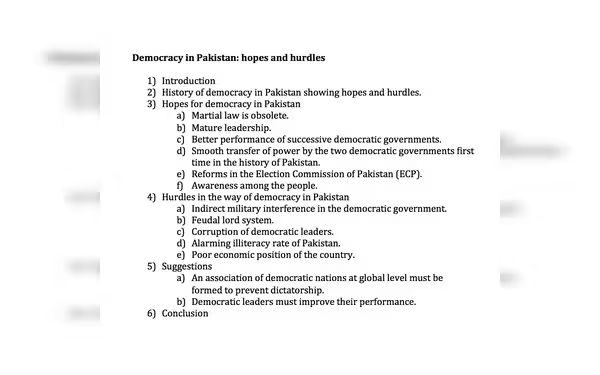Sunday, July 7, 2024 11:31 AM
Pakistan's Democratic Struggles: A Road to Progress
- Military interventions hinder Pakistan's democratic development
- Challenges like religious conservatism and military influence impede progress
- Economic growth, education, and civil society empowerment crucial for democracy
 Image Credits: The Authentic Post
Image Credits: The Authentic PostExplore Pakistan's turbulent journey towards democracy, marred by military dominance, political challenges, and religious tensions. Discover the crucial factors hindering progress and the essential steps needed for a truly democratic Pakistan.
Pakistan's tumultuous history, marked by military interventions and political instability, has hindered its path towards true democracy. Since gaining independence in 1947, military governments have frequently disrupted the nation's political landscape, impeding the development of strong leadership and democratic institutions.
Despite brief attempts at democracy, such as General Ayub Khan's rudimentary democracy in the 1960s, Pakistan has struggled to overcome challenges like religious conservatism, feudalism, and military influence. The country's journey towards democratisation has been further complicated by factors like the Cold War, the division of East Pakistan, and frequent coups.
The military's grip on power, support for feudal elites, and interference in economic and political spheres have stymied Pakistan's democratic progress. The nation's political institutions have remained dysfunctional, with legislators often failing to enact meaningful reforms or uphold democratic principles.
Modernization theory suggests that factors like urbanisation, education, and economic growth are crucial for transitioning to democratic societies. However, Pakistan's economy has faced challenges, with below-average growth rates impacting the country's ability to strengthen civil society and institutionalise democracy.
Religious influences, political coercion, and the rise of religious parties have further complicated Pakistan's democratic journey. Efforts to promote a liberal interpretation of Islam and establish a secular democracy have faced setbacks, particularly after the events of 9/11.
In conclusion, Pakistan's path to democracy is marred by military dominance, political immaturity, and religious tensions. To bolster democracy, political parties must focus on economic development, poverty alleviation, and education reforms. Addressing military interference, reducing inequality, and empowering civil society are essential steps towards achieving a truly democratic Pakistan.













